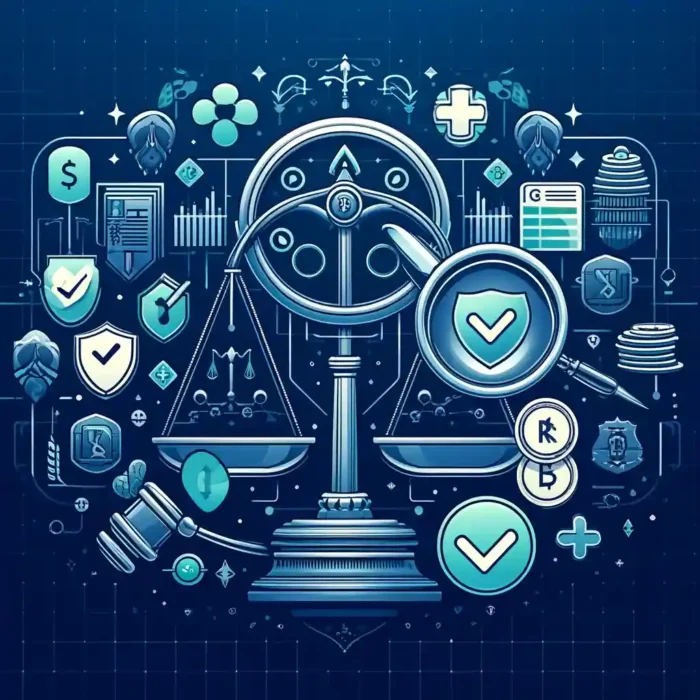Get Scam Alerts & The Latest Crypto News:
Venturing into the sparkling labyrinth of the cryptocurrency market can resemble a modern-day Indiana Jones quest. Each twist and turn reveals glittering opportunities, but lurking within these obscure corridors, regulatory risks are poised to strike the unwary. These ‘cryptic creatures’ can drain investments and leave ambitious plans in ruins. Thankfully, like our fedora-wearing hero, you too can dodge these pitfalls. Welcome to the uncharted territory of identifying regulatory risks in crypto, where due diligence is your golden idol against potential ruin. Together, we’ll navigate this mysterious terrain, highlighting the unseen and understanding the misunderstood. Buckle up and switch on your torch – it’s time to illuminate the shadowy corners of cryptocurrency regulation.
Understanding the Basics: Introduction to Regulatory Risks in Crypto
In the dynamic world of cryptocurrency, risk comes with the territory. One of the most significant threats to digital assets is regulatory risks. These are risks associated with changes in laws, rules or regulations governing the crypto space. Regulatory risks can significantly impact the value of cryptocurrencies or even lead to their outright ban.
There are several key components involved in identifying regulatory risks in crypto: Political Landscape, Global Regulations, Security Laws and Financial Regulations. These elements should be part of your due diligence process when investing in cryptocurrencies.
Political Landscape relates to the attitudes and policies of governments and regulatory bodies towards cryptocurrency. This can vary significantly from jurisdiction to jurisdiction. Some governments may be crypto-friendly, others may ban or restrict them.
Global Regulations refers to the international laws and regulations governing crypto. It is important to stay abreast of these global trends as they can have major implications for cryptocurrency values.
Security Laws can apply to cryptocurrencies in some jurisdictions. For example, in the U.S., the Securities and Exchange Commission may consider certain types of cryptocurrency assets as securities.
Financial Regulations relates to the rules of financial institutions, such as banks, and how they interact with cryptocurrencies. These regulations can significantly impact how you transact and store your cryptocurrency.
| Key Components |
|---|
| Political Landscape |
| Global Regulations |
| Security Laws |
| Financial Regulations |
Due diligence in the crypto space involves an understanding of these regulatory risks. It also demands vigilance in staying informed of changes to these regulations, as they can dramatically impact the crypto market.
Treading carefully: The Role of Due Diligence in Crypto Markets
Crypto markets are known for their high-flying profits and stomach-churning losses. The technology behind cryptocurrencies is novel and exciting. However, the field is also rife with regulatory risks. No prudent investor should venture into the space without first conducting due diligence. It is not enough nowadays to simply read a project’s whitepaper and buy into their vision. Researchers should consider various aspects such as legal compliances, team’s reputation, token economics, and project feasibility to mitigate potential risks.
Primarily, the legal compliance of a project should be thoroughly evaluated. Is the project legally registered? In what country? Bear in mind that there may be jurisdictions that are more lax in their oversight. Therefore, an informed investor will look for projects that have been vetted by stringent regulatory bodies. For instance, the Securities Exchange Commission or the Financial Conduct Authority.
| Entity | Countries |
|---|---|
| The Securities Exchange Commission | United States and others |
| The Financial Conduct Authority | United Kingdom |
Further, the team’s reputation often gets overlooked. The skills and the track record of each member must be analyzed. Even a cursory LinkedIn check can reveal a lot about their competence and legitimacy. Also, evaluate the token economics of the project. Check if the token’s supply and demand model makes sense. Is there a cap on the maximum supply? Or is it infinite? Lastly, assessing the project’s feasibility to deliver on its goals is also an important part of the due diligence process. This depends largely on the project’s business model, its use-case, and its resilience in the face of competition.
Engaging in due diligence can help you mitigate some of the risks in the volatile world of cryptocurrencies. While it cannot guarantee you complete safety from unpredictable losses, it can at least ensure that you are not being duped by unscrupulous projects and you are entering the crypto market well-informed.
(Mis)reading the Signs: Common Mistakes in Identifying Regulatory Risks
In the fast-paced and constantly evolving world of cryptocurrencies, it is essential to stay aware of the potential regulatory risks. Even seasoned investors can make the mistake of not paying sufficient attention to these risks, which can result in severe consequences. Adhering to the policies set by regulatory bodies not only ensures the legal operation of your activities but also gains trust among stakeholders.
Understanding regulatory risks requires an in-depth understanding of the legal landscape, where knowing the law is simply not enough. Be aware of the
global differences in regulations. It is important to understand that regulations vary by country; what may be legal in one country may not be so in another. This is a common mistake made while identifying regulatory risks. Having a robust due diligence process can help you prevent this mistake altogether.
| Country | Regulation |
|---|---|
| USA | Regulated |
| China | Banned |
| Japan | Regulated |
Apart from identifying the varied regulatory landscapes, it’s also crucial to be aware of the integrity of your cryptocurrencies. It is not enough to rely solely on the advertised transparency of blockchain technology. You must conduct thorough investigations into the practices of your chosen crypto platform or company. Fraudulent practices are, unfortunately, not uncommon in the crypto-world, and due diligence in this area could save you from significant monetary losses.
Recognizing the potential changes in regulations is also imperative. It’s not uncommon for regulations to be adjusted as authorities become more familiar with the technology and its implications. Understanding this possibility will ensure that you are able to adapt quickly and effectively to such changes, minimizing risk and enabling efficient operation.
Remember, with the lack of a standard framework for cryptocurrency regulations, navigating this complex landscape can be challenging. Take the time you need to get informed, and don’t hesitate to consult with legal advisors if necessary.
Digging Deeper: Using Technical Analysis to Understand Regulatory Risks
Parsing the Regulatory Landscape
Regardless of your technical expertise in cryptocurrency or blockchain technology, understanding the regulatory risks surrounding a particular cryptocurrency is crucial. While technical analysis provides historical data about price movements and trading volume, it won’t inform you about potential legal pitfalls or restrictions that may affect the value of your investment.
It’s essential to learn about the location and legal status of a cryptocurrency’s founding team. For instance, are they based in a country that’s friendly to cryptocurrency? Do the laws of that country easily accommodate blockchain-based ventures? Due diligence can help shed light on these questions. Consider studying legal resources, news reports, and even social media to gauge the regulatory climate of a cryptocurrency.
Factor in Compliance Efforts
Another key consideration is how seriously the cryptocurrency management team takes their regulatory obligations. A team that has invested in a legal counsel and compliance officer is a strong indicator that they are committed to following regulatory guidelines. It’s advisable to use technique to create a checklist for due diligence. Here is an example:
| Due Diligence Checklist |
|---|
| Examine the Team’s Legal Background |
| Research the Regulatory Climate in Relevant Countries |
| Evaluate Compliance Measures |
By carrying out a rigorous due diligence process, you can avoid getting caught out by unexpected regulatory changes. Remember, while technical analysis can help you predict market trends, it’s just one piece of the puzzle. Being aware of the changing regulatory landscape completes the picture and can help secure your investment in the tumultuous world of cryptocurrency.
Turning Identification into Strategy: Recommendations for Managing Regulatory Risks in Crypto
In the fast-paced and ever-changing world of cryptocurrency, regulatory risks pose a potential stumbling block for investors and entrepreneurs alike. Managing these risks effectively requires a deep understanding of the intricate workings of the crypto ecosystem and a vigilant approach towards new legislation. Today, we aim to unfold the ways to identify regulatory risks in crypto with due diligence.
Firstly, it is crucial to stay updated with latest crypto regulations. Regulators worldwide are gradually adapting their policies to address the rapid rise of digital currencies, and these new rules can significantly impact a crypto business. Routine checks on regulatory developments both domestically and internationally can aid in anticipating potential future regulatory risks.
Legal News Sources:
- International Legal News Websites
- Financial Regulatory Bodies’ Websites
- Trade Publications
- Legal Forums and Blogs
Secondly, maintaining healthy relationships with regulators can also prove beneficial. Building productive relationships with regulatory bodies can provide insight into regulatory expectations and developments in approaching new laws. This, in turn, assists in better risk management strategies.
| Regulatory Bodies | Contacting Procedure |
|---|---|
| Securities and Exchange Commission (SEC) | Through official website contact form or via email |
| Financial Conduct Authority (FCA) | Using the details available on their ’Contact us’ page |
| Financial Crimes Enforcement Network (FinCEN) | Via their Public Inquiry Form on the official website |
Lastly, engaging the services of a legal expert with a focus on crypto regulations can provide informed counsel. They can assist in navigating the complex world of blockchain regulations and provide advice tailored to your specific crypto operations.
Legal Criteria:
- Certification from a recognized law institution
- Experience in dealing with crypto regulations
- Ability to interpret and apply legislation to business practice
In closing, mitigating regulatory risks in crypto involves active engagement with evolving regulations, fostering strong relationships with regulatory bodies, and seeking expert advice when necessary.
In Summary
As we step further into the vividly unpredictable crypto ether, we must remain armed with knowledge, strategic insight, and diligent observance. Identifying regulatory risks in this cryptographic cosmos becomes paramount to shield from potential storms. Remember, the crypto landscape isn’t a minefield if you walk into it with due diligence and knowledgeable anticipation. Embrace the warp-speed evolution but also let astute vigilance be your guiding star in this digital journey. Let’s stride forward into this decentralized future, our steps measured with insight, our path enlightened with due diligence. The crypto universe is vast and full of wonders, don’t just merely gaze at it—fathom it, comprehend it, and conquer it. As we send off this guide into the ether, it will surely arm you with the right tools to navigate and master this brave new world of cryptocurrencies and blockchain. Safe journey on your crypto odyssey.

